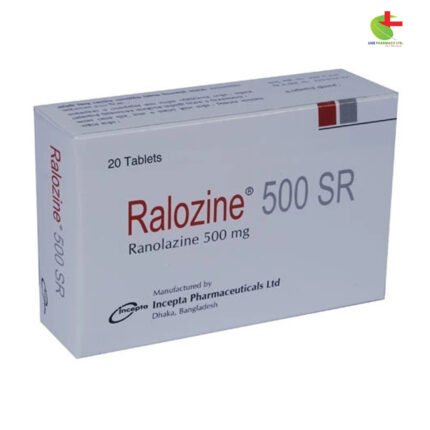Ramoril Plus 2.5
50.00৳ Strip
- Ramoril Plus combines Ramipril (ACE inhibitor) and Hydrochlorothiazide (thiazide diuretic) for the treatment of mild to moderate hypertension.
- It lowers blood pressure by reducing angiotensin II levels and promoting sodium excretion.
- Ideal for patients needing combination therapy for effective blood pressure management.
- Always use under the guidance of a healthcare professional.
 Brand
Brand
|
Incepta Pharmaceuticals Ltd |
|---|---|
 Generics
Generics
|
Ramipril + Hydrochlorothiazide |
 Type
Type
|
Tablet |
Indications
Ramoril Plus is indicated for the treatment of mild to moderate hypertension in patients who require combination therapy. This formulation is ideal for those already stabilized on the individual components of Ramipril and Hydrochlorothiazide in the same proportion.
Pharmacology
- Ramipril: An ACE (angiotensin-converting enzyme) inhibitor, Ramipril blocks the conversion of angiotensin I to angiotensin II, leading to lower blood pressure and reduced aldosterone secretion. It helps manage heart failure and lowers the risk of strokes, myocardial infarctions, and cardiovascular-related mortality. Its long-acting formula makes it suitable for long-term use.
- Hydrochlorothiazide: A thiazide diuretic, it promotes the excretion of sodium and chloride, reduces plasma volume, and increases aldosterone secretion, leading to a decrease in blood pressure. When combined with ACE inhibitors like Ramipril, it mitigates the potassium loss typically caused by diuretics.
Dosage & Administration
- For patients inadequately controlled by Ramipril or Hydrochlorothiazide alone: Start with Ramipril 2.5 mg + Hydrochlorothiazide 12.5 mg or Ramipril 5 mg + Hydrochlorothiazide 25 mg once daily.
- Replacement Therapy: If the patient is already using separate Ramipril and Hydrochlorothiazide tablets, they can switch to the combination form for convenience.
- Maximum Dose: The highest recommended daily dose is 10 mg Ramipril + 50 mg Hydrochlorothiazide (equivalent to four Ramipril 2.5 mg + Hydrochlorothiazide 12.5 mg tablets or two Ramipril 5 mg + Hydrochlorothiazide 25 mg tablets).
Interaction
- Potential interactions: Combining Ramipril Plus with other antihypertensive agents, nitrates, tricyclic antidepressants, or diuretics can enhance its blood pressure-lowering effects.
- Avoid: Use of Ramipril/Hydrochlorothiazide with acetylsalicylic acid, indomethacin, or alcohol can reduce the antihypertensive effect and may increase the risk of kidney issues.
Contraindications
- Do not use in patients with known hypersensitivity to any of the components (Ramipril, Hydrochlorothiazide).
- Avoid in cases of severe kidney dysfunction, active cardiovascular instability, and conditions that could lead to dangerous blood pressure drops, such as renal artery stenosis or severe electrolyte imbalances.
Side Effects
Common side effects include headache, dizziness, nausea, cough, and weakness. Serious but rare side effects may involve pulmonary edema, electrolyte imbalances, or hyperglycemia.
Pregnancy & Lactation
- Pregnancy: Not recommended during pregnancy due to potential harm to the fetus.
- Lactation: Should not be used during breastfeeding, as both components are excreted in breast milk.
Precautions & Warnings
Patients should be monitored for electrolyte imbalances, particularly potassium levels, during treatment. Caution is needed for those with renal impairment, diabetes, and heart failure. Ensure hydration before starting treatment to minimize risks of dehydration or low blood pressure.
Use in Special Populations
- Renal Impairment: Start with Ramipril 1.25 mg and adjust accordingly.
- Elderly: Consider a reduced starting dose due to potential sensitivity to the drug.
Overdose Effects
- Ramipril: Overdose may cause hypotension, managed by normal saline infusion.
- Hydrochlorothiazide: May cause electrolyte imbalances (hypokalemia, dehydration). Monitor and correct any deficiencies as needed.
Therapeutic Class
- Combined antihypertensive therapy (ACE inhibitors + thiazide diuretics).
Storage Conditions
Store in a cool, dry place, away from direct light. Keep out of reach of children.













Reviews
There are no reviews yet.